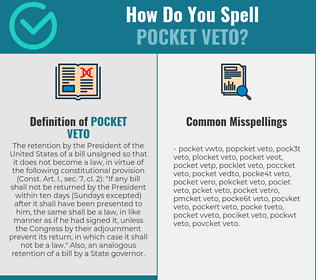POCKET VETO Meaning and
Definition
-
A "pocket veto" is a political term referring to a method whereby a government official, typically the president or a governor, can indirectly veto a bill without explicitly rejecting it. A pocket veto occurs when the official receives a bill passed by the legislature, but deliberately takes no action on it, effectively allowing the bill to expire by avoiding signing it into law.
The term "pocket veto" originated from the use of a pocket as a metaphorical representation of inaction. When a bill is sent to the president or governor, they have the option to either sign it, veto it, or simply ignore it. If the official does not sign the bill within the designated period, usually a few days or weeks, it automatically becomes law, unless the legislative session ends before that period.
By employing a pocket veto, the government official indirectly rejects the bill without the need for an official veto message or veto override vote from the legislative body. This method can be utilized strategically to avoid public scrutiny or political consequences, as it allows for the bill to be effectively killed without the official explicitly taking a stance on it.
While the use of a pocket veto can be controversial, it is seen as a constitutionally sanctioned power intended to maintain a balance of power between the executive and legislative branches of government. Its existence ensures that bills cannot become law through negligence or inaction by the government official, while also allowing for a check on potentially unnecessary or unfavorable legislation.
Common Misspellings for POCKET VETO
- oocket veto
- locket veto
- -ocket veto
- 0ocket veto
- picket veto
- pkcket veto
- plcket veto
- ppcket veto
- p0cket veto
- p9cket veto
- poxket veto
- povket veto
- pofket veto
- podket veto
- pocjet veto
- pocmet veto
- poclet veto
- pocoet veto
- pociet veto
Etymology of POCKET VETO
The term "pocket veto" originated in the United States and has its roots in the literal meaning of the words "pocket" and "veto".
The concept of a veto refers to the power of a person, usually a president or a governor, to reject a proposed law or legislation. When this happens, the proposed law does not become official.
The term "pocket" in "pocket veto" refers to the practice of a president or governor "pocketing" or retaining a bill without signing it, effectively preventing it from becoming law. The term emphasizes that the veto is informal or unofficial, as the bill is not formally rejected by the president or governor.
The pocket veto power allows the president or governor to simply store the bill in their pocket, or figuratively, to set it aside without taking any action, rather than rejecting it explicitly by vetoing it officially.
Similar spelling words for POCKET VETO
Infographic
Add the infographic to your website:





